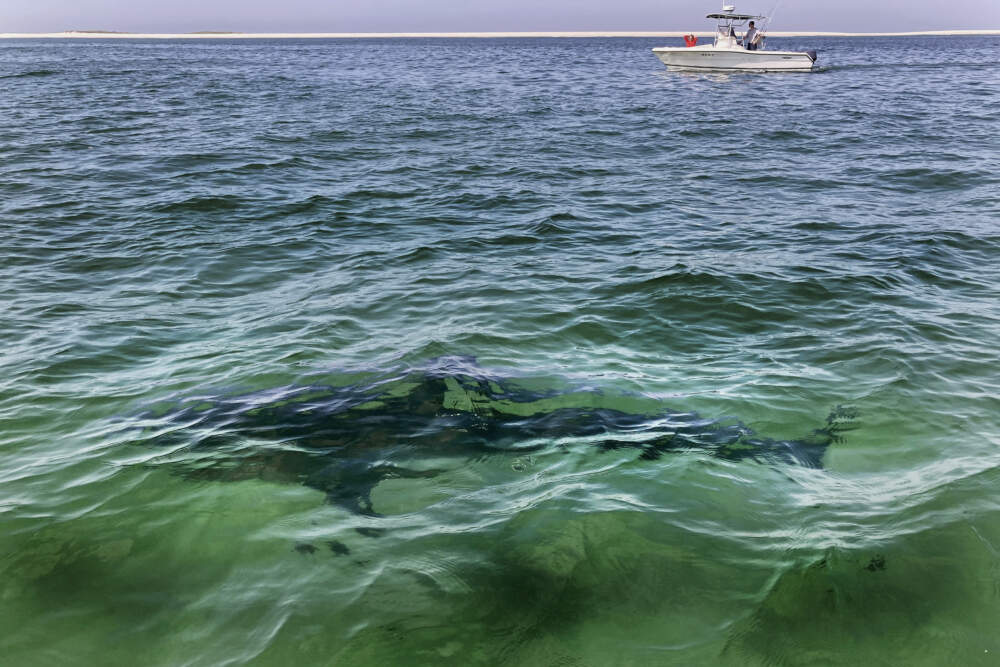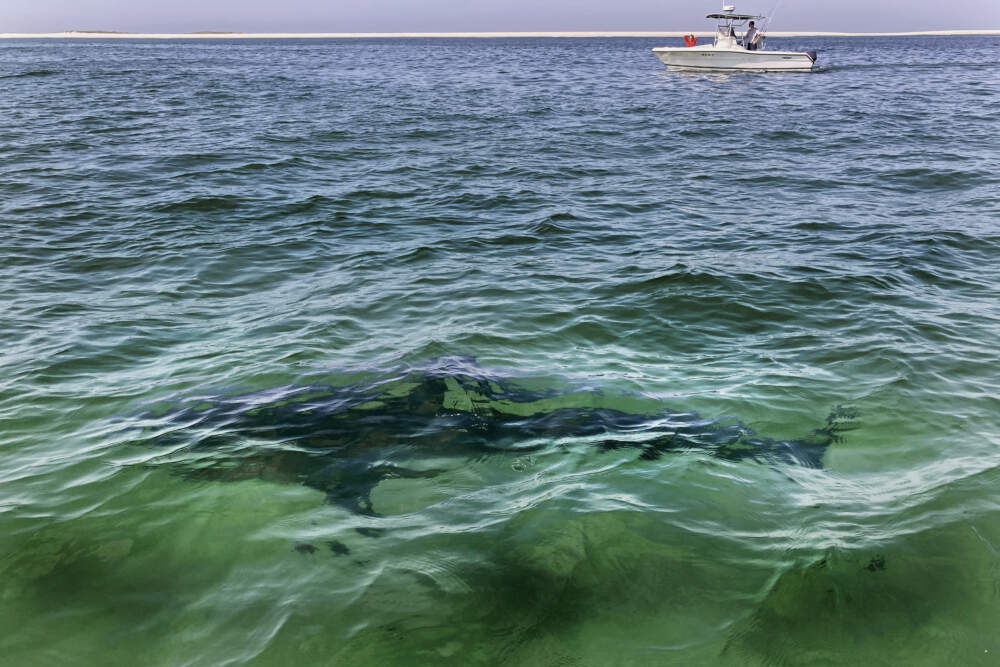
A white shark swims across a sand bar off the Massachusetts coast of Cape Cod on Aug. 13, 2021. (Phil Marcelo/AP)
Scientists from the Woods Hole Oceanographic Institution are seeking a federal permit to experiment in the waters off Cape Cod and see if tweaking the ocean’s chemistry could help slow climate change.
If the project moves forward, it will likely be the first ocean field test of this technology in the U.S. But the plan faces resistance from both environmentalists and the commercial fishing industry.
The scientists want to disperse 6,600 gallons of sodium hydroxide — a strong base — into the ocean about 10 miles south of Martha’s Vineyard. The process, called ocean alkalinity enhancement or OAE, should temporarily increase that patch of water’s ability to absorb carbon dioxide from the air. This first phase of the project, targeted for early fall, will test chemical changes to the seawater, diffusion of the chemical and effects on the ecosystem.
If successful, the team plans to conduct a larger trial next year in the Gulf of Maine.
Dan McCorkle, co-principal investigator of the project and a recently retired Woods Hole researcher, said the team chose a part of ocean that would minimize impact on marine life, and that they will stop the release of sodium hydroxide if marine mammals are present. The chemical will likely be detectable in an area a couple miles in diameter and should dissipate within five days.
« We care about the environment, too, » said McCorkle. « We wouldn’t be doing this if we thought there was going to be a big impact [on marine life]. »
The proposal for this « climate engineering » or « geoengineering » experiment has attracted criticism from commercial fishing groups, environmental advocates and private citizens. They say the project is too risky to marine life, a distraction from the goal of transitioning the world off fossil fuels and unlikely to slow climate change in a meaningful way.
« To have any impact on climate change, you would have to deploy this geoengineering technology at a truly massive global scale, » said Benjamin Day, a senior campaigner with the environmental nonprofit Friends of the Earth. And because mining and shipping the alkaline materials would use so much energy, he said, even a massive deployment « would have a relatively minor impact in offsetting human emissions. »
The global ocean has mitigated climate change by absorbing about a quarter of human-induced CO2 emissions, but it has come at a cost. When carbon dioxide dissolves in seawater, it forms carbonic acid. This increases ocean acidity, which stresses shellfish and coral reefs, and also lessens the ocean’s ability absorb CO2.
Advocates of the project — known as Locking away Ocean Carbon in the Northeast Shelf and Slope, or LOC-NESS — say it merely reverses some of this process, enhancing the ocean’s natural ability to absorb carbon dioxide.
« Given our seeming inability or unwillingness to rapidly shift away from fossil fuel burning, which we absolutely have to do, it may be important to start studying whether any of these methods really are going to be helpful, » McCorkle said, « whether they’re going to help get carbon out of the atmosphere. »
He noted commercial groups already sell carbon credits for ocean alkalinity enhancement, without fully understanding the science, effectiveness or possible harms.
« It’s important now to carry out research that’s science-based and science-focused, to know whether these approaches can work and whether they’re a path we want to go down, » he said.
Woods Hole researchers have applied to the Environmental Protection Agency for a permit for the work. The public comment period for both phases of the project is open until 11:59 p.m. on Thursday, July 11.
Groups including the Stellwagen Bank Charter Boat Association, the Massachusetts Lobstermen’s Association and the Maine Department of Marine Resources have expressed concerns about — or outright opposition to — the project.
In a letter to the EPA, the Massachusetts Lobstermen’s Association wrote that more lab work is needed « before truckloads of liquid alkaline can be dumped in the ocean. »
« The notion that we can manipulate Earth’s systems without consequences is the type of thinking that got us into this climate crisis in the first place, » said Day. « It’s hubris to think that we can now exert domination and control over Earth systems in order to get the results that we want. »
Source: Wbur


